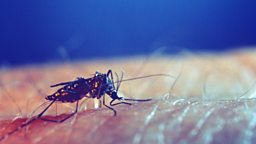Ten things you鈥檝e always wanted to know about yourself
In The Curious Cases of Rutherford and Fry, science sleuths Adam and Hannah investigate everyday mysteries sent by listeners. Here are ten things they discovered about you and your body…

1. Why do I get d茅j脿 vu?
One theory involves a part of your brain called the temporal lobe, which is responsible for feelings of familiarity. This circuit is sometimes triggered by mistake, creating a false memory which makes a new situation feel strangely familiar. Your brain’s fact-checking system then kicks in and you realise it’s actually the first time you’ve been in that situation and that you’ve just experienced déjà vu.
-
![]()
More facts about that funny feeling of the familiar.
2. Why do I see faces in unusual places?
From birth we pick out patterns that resemble faces. Babies who are just nine minutes old will spend longer looking at patterns of dots and dashes which look like faces, compared with shapes that don’t resemble human features.
Your keen eye for faces leads to a strange phenomenon called pareidolia where you spot faces in some of the most unexpected places!

Photo gallery: Faces in odd places

3. Why isn’t my leg hair as long as my head hair?
All the hairs on your body have a growth cycle – forming, growing and eventually falling out. In many hairy animals these cycles are synchronised, meaning they moult periodically, shedding their entire coat. But the five million hairs on your skin are shedding continuously.

The time it takes for a hair to complete its cycle varies across your body, lasting from four weeks to seven years. So the hairs on your legs will never become as long as those on your head. Unless, of course, you are bald!
4. Why do I cry?
There are three different types of tears. “Basal” tears keep your eyes wet and nourished. “Reflex” tears are produced as a response to an irritant, designed to wash the invader away. Finally, “psychic” or crying tears are triggered by a range of emotions, but their purpose has puzzled scientists for hundreds of years.
Many psychologists think crying is about communication. If you cry through sadness, people might comfort you. And if you cry through joy, it’s a way of bonding with those around you.
Some studies have shown that having a good cry makes you feel better. It’s thought crying might also affect your perception of pain.
5. Why do I dream?

Some psychologists think you deal with threats and practise survival techniques inside your dreams.
The purpose of dreaming is still a scientific mystery. Some psychologists think you deal with threats and practise survival techniques inside your dreams, like running away from dangerous situations or people. Others believe that dreams help you form memories, or process emotions.
However, another school of thought claims that these nightly stories are just a by-product of your active, sleepy brain. If this is true, your dreams are simply a reflection of what’s going on in your mind and don’t have a specific purpose.
6. Why do I faint?
Standing upwards presents a bit of a problem for your brain. Your blood has to fight against the force of gravity to pump enough of the red stuff into your grey matter. Normally this is done by your nerves and heart working together to maintain the perfect blood pressure. This means you can get enough blood, and therefore oxygen, into your brain to keep everything ticking over perfectly.
Sometimes, especially when you exercise, blood is diverted from your brain to your muscles because they need a boost of oxygen to perform well. However, this bloody diversion can prevent enough oxygen reaching your brain. If this happens, your body pulls an emergency stop – fainting. Your heart slows down and your blood vessels dilate. This makes your blood pressure drop, you lose consciousness, and your body slumps downwards. Falling over is never pleasant, but when you faint it’s extremely useful. Because your body is nearer the ground, your brain and heart are now at a similar level. So your blood doesn’t have to work as hard against the force of gravity, flooding back into your brain quickly, and allowing you to make a speedy recovery.

Why do we faint?
Why do humans faint but giraffes don't? Drs Adam Rutherford and Hannah Fry investigate.
7. Why do bites and stings itch?
If you’re bitten by an insect, or stung by a plant, toxins left on your skin trigger the release of histamines, your body’s natural immune response. Signals travel along nerve fibres into your brain which then sends itchy sensations back to the site of the sting.
Scratching is a useful response. In the first instance, it bats away the poisonous plant or biting insect. Scratching also makes your blood vessels expand allowing white blood cells and plasma to wash away the toxin. This is why your skin becomes red and lumpy.
But the more you scratch, the more you itch. Scratching releases more histamine, making you even more itchy. This sets up an itch-scratch cycle which can damage skin tissue.

8. Why does my voice change as I get older?
We all know that male voices change during adolescence, when the voice box moves down inside the throat and starts to stick out to form an “Adam’s apple”. So the distance between the voice box and mouth elongates, resulting in a longer tube which produces lower sounds.
Women go through something similar during the menopause, although the voice doesn’t deepen as dramatically.
As you get older, your vocal cords become floppy and air leaks out as you talk, making you sound breathier. When your vocal muscles weaken, the pitch of your voice can go up again as you reach old age.
-
![]()
Hannah and Adam celebrate our marvellous human instrument.
9. Why do some songs get stuck in my head?
Tunes with simple ups and downs or “melodic arcs” are more likely than others to give you earworms because they are easier for your brain to latch on to. Melodic arcs are common in nursery rhymes and they also feature in many pop songs and classical pieces.
Unusual or unexpected “melodic leaps” are another feature of earworms. Lady Gaga’s Bad Romance is a good example.
10. Why do I hate sprouts?
Because you might be a “supertaster”. Around 15 percent of the Western population have genetic differences that affect their sense of taste, meaning bitter tastes are stronger. They live in a “neon” taste world which means the same food tastes completely different to them. However, with repeated exposure, some supertasters can even learn to love sprouts. Or at least tolerate a couple at Christmas.

Melodic leaps: Lady Gaga's "earworm"

More science from Radio 4
-
![]()
The Curious Cases of Rutherford and Fry
Science sleuths Dr Adam Rutherford and Dr Hannah Fry investigate everyday mysteries sent by listeners.
-
![]()
How much do you know about cats?
-
![]()
Weird facts about animal sex.
-
![]()
All cooking is chemistry.

























